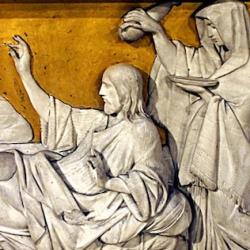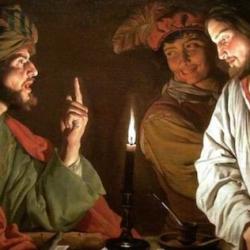This is a selection from the forthcoming second volume of my commentary on Matthew.
Matthew 28 is a richly typological passage. Jesus’ appearance to the eleven culminates not only the story of Matthew’s gospel, but also shows Jesus as the fulfillment of a host of Old Testament hopes.
The Magi were the first to worship the king of the Jews (2:2, 11). Now that Jesus has been raised, the eleven remaining disciples join in (28:16). This is no ordinary bow; they prostrate themselves in total submission to Jesus, acknowledging that he is God. He was identified as “Immanuel” at the beginning of the gospel (1:23), and now He promises that His divine presence will remain with the disciples forever (28:20; cf. Deut 31:23).
Jesus is Yahweh on the mountain, a new Mount Sinai, instructing His disciples to keep and teach His commandments; a new Zion, where the disciples worship.
Jesus is the new Joseph. The only other place in the Bible where “eleven” people “worship” is in Genesis 37, when Joseph has a dream that the sun, moon, and eleven stars will fall to worship him. In the story of Joseph, the dream finally comes to fulfillment in Joseph’s “resurrection.” Joseph’s brothers reject him, plan to kill him, sell him into slavery to the Gentiles, but Joseph is raised up and given authority over all Egypt.
It’s a preview of Jesus’ story-line: The disciples have betrayed Jesus, fleeing from Him in the garden; Jesus’ Jewish brothers have killed Him, but now God has raised Jesus up and given Him all authority in heaven and on earth.
The Joseph story, I think, helps us capture the psychological tone of this moment. When Joseph’s brothers finally realized who Joseph was, realized that lost Joseph had been found and “dead” Joseph had risen again, they were afraid. They were the ones who turned Joseph over to the Egyptians. Maybe he’s going to get his revenge, they think. But Joseph assures them that the things they intended for evil, God meant for good, to bring salvation to many people. Jesus’ disciples also have reason to fear. The last time they saw Jesus was in the garden, and they could only see Him by looking over their shoulders as they fled from the guards arresting Jesus. Now Jesus is back, and He wants to see them in Galilee. What is He going to say? Are they going to hear Him say, “Depart from Me, I never knew you?”
No: Jesus says what Joseph said: “God intended it for good, to give life to the sons of Israel.”
Jesus is the Son of Man. In Daniel 7, the prophet sees a vision of one like the Son of Man inheriting all authority of all the nations. The Risen Jesus is that Son of Man. His death and resurrection have changed everything. Matthew hammers on the point with the repetition of the word “all.” Jesus has all authority, sends His disciples to make disciples of all nations, tells them to teach all His commandments, and promises His presence through all ages (vv. 18-20). These “alls” are linked: Because Jesus has all authority, He sends His disciples to all nations, and all His commandments are weighty.
Jesus is the new world emperor. As we have seen throughout our studies in Matthew, Matthew’s gospel recapitulates the history of Israel. Jesus has played the role of Moses, of Joshua, of Solomon, of Elisha, of Jeremiah. He has been through exodus and conquest and kingship and a divided kingdom and He has predicted the fall of the temple. In His death, He has been forsaken by His Father, sharing the exile of His people, but in His resurrection He has returned from the grave of exile.
In these last verses, Jesus is the great World Emperor, the new Cyrus, who commissions His disciples to “go” (cf. 2 Chr 36:22-23): “All the kingdoms of the earth the LORD God of heaven has given me. And He has commanded me to build Him a house at Jerusalem which is in Judah. Who is among you of all His people? May the LORD his God be with him, and let him go up!”
Cyrus claims to have authority from the God of heaven. He calls on Yahweh to be with his people. He gives a command to go. Jesus is the new Cyrus, but Jesus is greater than Cyrus. He has authority in heaven, and not merely authority from the God of heaven, or authority on earth. Jesus is the God who will be with His disciples. He gives a command to Go, but instead of sending the eleven back to their homeland, he sends them out to places they’ve never been.
Israel never existed for herself, but for the sake of the nations. Now that Jesus has risen and issues this command as a new Cyrus, that reality is even more pronounced. Even more than Israel, the church exists for the sake of the world. Jesus did not come to be served but to serve. He came to make disciples, and by His resurrection He gives us the privilege of sharing in making disciples of the nations.
No church exists for the sake of church. We are called together to be sent out, called together so that we can be commissioned to fill our town with disciples, and to participate in the making of disciples throughout the world. We can have the best worship imaginable, the best teaching, the deepest fellowship. All those are good things, but if we don’t “go” and “make disciples,” then we are failing to be the church God wants us to be. As folks in the Emerging/Emergent church say, the church doesn’t have a mission; it is a mission.
The eleven came to Jesus and worshiped Him. But Jesus didn’t want them to stay on the mountain to worship Him. He wanted them to go from the mountain, into the valley below, making disciples by baptizing and teaching. We want to stay on the mountain. It’s comfortable and safe. Jesus won’t let us. Jesus tells us to get outta here.












